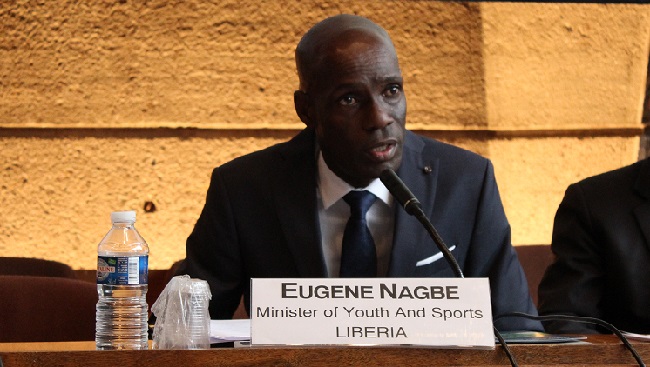Technical, vocational education a priority
Liberia’s Youth and Sports Minister Lenn Eugene Nagbe says the provision of technical and vocational education to Liberian youth is a major national priority, which deserves the support of members of the international community and partners.
Minister Nagbe said with the huge unemployment among young people, due largely to lack of formal education and vocational skills, there is a national imperative to be able to provide some technical skills for the unemployed, adding that Liberia’s future depends on its young people.
Minister Nagbe speaking Thursday at a session at the UNESCO 38th General Conference in Paris, France on the Theme : Technical and Vocational and Training(TVET) in the 2030 Agenda for Sustainable Develoment said with the huge illiteracy and unemployment rates in Liberia, a well structured technical and vocational education that is aligned to addressing the current demand on the job market is more than desired and welcomed.
He said currently the country TVET program has seen a strong transformation and reform, coming from a state where there were no TVET policy, no capacity, no trained teachers and no curriculum, the country now has a well crafted TVET policy, an accreditatioin regime, a certification regime and the construction of a state of the art modern TVET complex in the country.
Minister Nagbe noted that in some respect TVET is not only a skill development program or a socio-economic issue, but a national security problem considering that over 80% of young Liberians age 18 to 24 who are illiterate and one- third are without emploment and no skills training.
He said concrete actions have been taken by the Liberian Government to rebuild old TVET institutions and also build now ones for the demand it provides for the population.
Other panelists included the Sweden’s education minister Gustav Fridolin, the assistant director general for education at UNESCO, Dr. Qian Tang and the director of the International Center for Technical and Vocational Educational Training, Shyarmal Majumdar.
Minister Werner said the education ministry will continue a process of decentralization which will transfer management and monitoring power to counties. Additionally, it will establish three centers of excellence, including a center for accreditation, as planned under the 2011 Education Reform Act. These two initiatives are estimated to cost $3.5 million.
He said the strategy to transform the educational system in Liberia means that change is necessary and must be immediate. He noted the Ministry’s goals are that by 2017, the foundations are in place for a Liberian education system that improves all children and young people’s learning. By 2020, there will be a significant improvement in children’s learning outcomes and national literacy rates.
Minister Werner said there are over 313000 children between the age of six and eleven who are believed to be out of school, that more than 80% of young people aged 15-24 are illiterate, one-third(1/3) of the young people are not in employment, education or training, there are not enough safe quality schools, core literacy and numeracy skills are not taught, over a third of the teachers are not qualified, girls are less likely to enroll, stay in school and graduate and secondary level education is under resourced.
He commended the Director General of UNESCO Irina Bokova and her team for the Teachers Education (ITC) capacity-building initiatives through the Chinese Government and for the process leading to the approval of Providence Island to obtain Heritage Status based upon on recommendation of about sixty-eight (68) historical sites submitted to the World Heritage Center.


